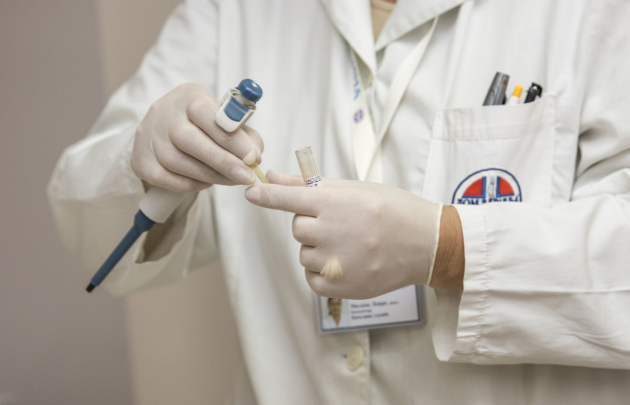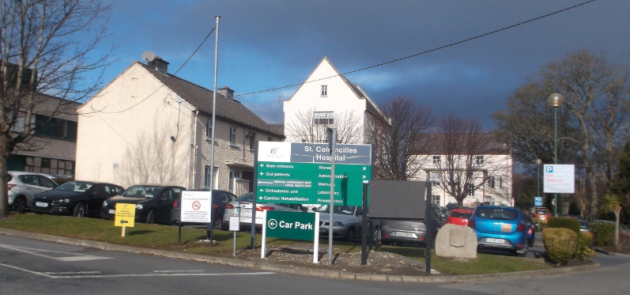
Why I went to America to finally get my endometriosis diagnosis
By Kate Brayden
I don't trust doctors with my body.
First of all, they're not Gods, they're human. As a young woman, and especially for people of colour and for those with disabilities, trusting someone with your body can be a dangerous mistake.
Second of all; I have been misdiagnosed numerous times during my three years of chronic pain, yet I managed to get diagnosed with endometriosis in three years when the average amount of time is remarkably longer. In fact, it takes the regular person with a uterus nine years in Ireland to get handed their scratch card with the unlucky result on it.

My father is a pharmacologist, and when I asked him why the funding for research regarding this particular illness is so low, he said that it was presumably because of it's rarity. I then pointed out that it affects one in 10 people with uteruses (to include the transgender community), and he was undeniably disturbed. It's one of the main links to female infertility, yet the progress and pain which women have to go through to be believed and treated is still preposterously lengthy.
Endometriosis is an illness affecting people with uteruses, where tissue which lines the uterus (the endometrium) grows outside your womb. It commonly involves your ovaries, fallopian tubes and tissue lining your pelvis, but can appear in the bowel and bladder also. Displaced endometrial tissue continues to act as if everything was regular- it thickens, breaks down and bleeds every time you get your period. It becomes trapped, without any way to exit the body. The symptoms include heavy bleeding during menstruation, lower back pain, pain during sex, infertility, pain during urination or with bowel movements, nausea, bloating and dysmenorrhea (painful periods.) It's zero craic, I'll tell you that for free.
It's often misdiagnosed as IBS, ovarian cysts, Pelvic Inflammatory Disorder (PIV) or even just female hysteria, due to the 'gender pain gap'. Back in the day, people genuinely created an illness surrounding female mental health, with symptoms attributing to; delusions, nervousness, hallucinations, emotional outbursts and various urges of the sexual variety. A bit like witch-hunting, where 'deviant' women (basically all the single ladies and spinsters) were presumed to be the devil's workers purely out of misogyny. The word 'womb' actually translates to 'hysteria', insinuating that anyone cursed with this life-bearing organ is marked with it's limitations and presumptions about the woman's mind and body.
Caroline Criado Perez' vast and valuable work, Invisible Women: Data Bias in a World Designed for Men, argues that the gender pain gap is part and pace of something bigger; “gender data gap.” The data which society has collected is typically about men's experiences, and most often straight, white men. The data is used to allocate research funding and design decisions all around us from public transport to housing, healthcare to infrastructure. The 'default', is always male, she says.
Pain medication has been designed by men with men in mind as the default user, therefore the side effects are rarely tested on women. This is only one small example of the repercussions in female healthcare of the gender data gap. We are twice as likely to die of heart related diseases, and far less likely to be given pain relief or treated immediately in the Emergency Department.
After suffering for two years of chronic pain, I know when to spot a doctor who sees my symptoms as 'psychosomatic'. That's in inverted commas because ALL pain is real, even for those whose emotion is controlling their physical torment. After exhausting all my resources in the Irish healthcare system as well as the UK, I decided it was time to remove all my savings from the bank and book a plane ticket to Washington DC. When you have intense chronic pain every single day and doctors have no idea how to help you, spontaneous and stubborn choices are easy. I learned to go with my gut, and to stand up for myself in clinics. Many female chronic pain sufferers maintain that they receive noticeably better treatment and empathy if her boyfriend or husband is in the room with them. I can also vouch for this. When my boyfriend accompanied me to doctor appointments, the practitioner would often turn to him for answers to questions which were directed at me, or about me. 'Health-care gaslighting' is oh so real, and I have lost count of how many times I was told to 'take a Panadol' when I went to A&E.
One of my first consultant experiences where I was having extreme abdominal cramping, nausea and burning sensations in my pelvis, back and legs was in a major maternity hospital in Dublin. It was intimidating for a 21-year-old woman who was neither pregnant nor accompanied by anyone. The consultant who I waited four months in crippling pain to meet was a prominent doctor whose name was tied to the CervicalCheck scandal. Basically, I waited to see a doctor who was destined to shrug me off.
It went downhill from there. Over the course of two and a half years, I had nerve blocker injections, was put on Lyrica and Amitriptylene (two nerve pain medications with enormously harsh side effects and little worth), had intense physiotherapy, diet transformation, two inconclusive biopsies, smear tests, hormone treatments, and every blood, allergy and auto-immune test under the sun. I was refused a CT scan and an MRI, and decided it was time to get a laparoscopy. This is the only way for a woman to find out if she has endometriosis, and despite the fact that I fit all the symptoms, it was never offered to me. Just coming up to my second year of consistent pain, I was sent to a consultant gynaecologist in the Mater Private to stop my menstrual cycle. My nerve pain was cyclical and I desperately wanted to stop this aspect of my pain. I requested a laparoscopy from a relatively young, male doctor, and was refused. I explained that aspects of my pain fitted the symptoms, but nevertheless he denied it. After calling a family member into the room for back-up, he eventually agreed and I was scheduled in for the keyhole surgery.

I was brought in some time later for my results, instead of being called over the phone or sent an email. He spoke to me for under two minutes, said there was no evidence for my pain and my GP ceased my pain medication. He said there was no endometriosis in the scans, and that he had no other ideas to offer me for my mysterious chronic illness. In under two minutes and for €200, his words translated to; 'I don't believe you. You're being dramatic.' I stormed out of his office and slammed the door on the Irish healthcare system.
Six months later I was on a plane to see one of the top doctors in the US, and knew I wouldn't regret a thing. I met the doctor in a serene clinic in Washington DC, and he greeted me with a hug. Already I had more confidence, even though I was paying a huge price for it.
Two hours with the doctor included an examination, a comprehensive survey of my entire medical history since birth (mental, physical and sexual) and a consultation. As it turns out, I also walked away with a surgery plan and diagnosis. After three years, I got my hope back in two hours. I'd have paid millions if I had it, and it was worth every cent. I booked the surgery for a few months later, and organised time off work. Then I booked my flights to New York, packed my bags and brought two family members who would take care of me for the four week recovery. Three of those weeks were spent holed up, unable to move, in a New Jersey Airbnb. After the surgery, my doctor (who has a stellar reputation and has carried out over 800 of these surgeries) said that endometriosis was mysteriously found during the procedure. He exclaimed that it was the first time he'd ever seen it in one of his patients, and that it was in an extremely rare place which no other doctor of his type would have been able to remove except him. He's full of confidence in himself, but he's right to be this way. He gives women their lives back and sees them go on to live without pain and to be able to have children and happy, healthy relationships.
I pushed aside my surprise about this setback, and focused on my nerve removal surgery recovery. Six gruelling weeks later, I had watched enough Netflix to power a large, densely populated city and was ready to fly back to New York for my check-up. I brought the laparoscopy from the Mater Private one year previously along with me for my surgeon to inspect. He had sent off the tissue to the pathology department, who were baffled by this and said they disagreed with his diagnosis. They had no suggestion for what it could be, despite the fact that the tissue looks exactly like endometriosis lesions. For those who aren't aware, endometriosis lesions look like black gunpowder rings. (Kind of like something from Stranger Things.)
My surgeon and a gynaecologist both examined my Irish scans and immediately pointed out the disease in the images, thus diagnosing me with the illness. It's safe to say I am not impressed with the Mater, but I also feel let down by nearly every doctor who saw me. I went to a GP with this pain over 15 times (5 separate GPs, I might add), visited three Irish hospitals on numerous occasions, flew to the UK multiple times to see professors in the chronic pain field and was misdiagnosed. I am now on a progesterone pill, which will hopefully suppress my symptoms, and am investigating whether the endometriosis is in my bladder. Yet how can I trust what results I am given in the Irish healthcare system, after this?
There is so much left to be done, when it comes to this illness. In terms of funding, it is increasingly shown that male pleasure trumps female pain; research of erectile dysfunction receives more funding than every female pain disorder combined, despite the fact that one-in-three women will experience this at some stage.
A blood test is currently in the works to discover endometriosis without having to undergo a flawed keyhole surgery. Amazingly, a new pill is being trialled which could potentially cure the lesions themselves, according to scientists at Washington School of Medicine. It's only early days; the drug has been tested on mice, but it's hoped the human trials will present similar findings. The antibiotics could potentially cure or reverse the effects of endometriosis, essentially ending the pain of millions of women. While I wish this pill could have been available three years ago, I will still stand up for myself to demand access to this treatment, I will still research the side effects and long term tested effects doggedly, and I will still never stop questioning every detail a doctor tells me. It could change your life, even if they call you hysterical.
Feature image credit: Flickr/@P_I_O_T_R


















